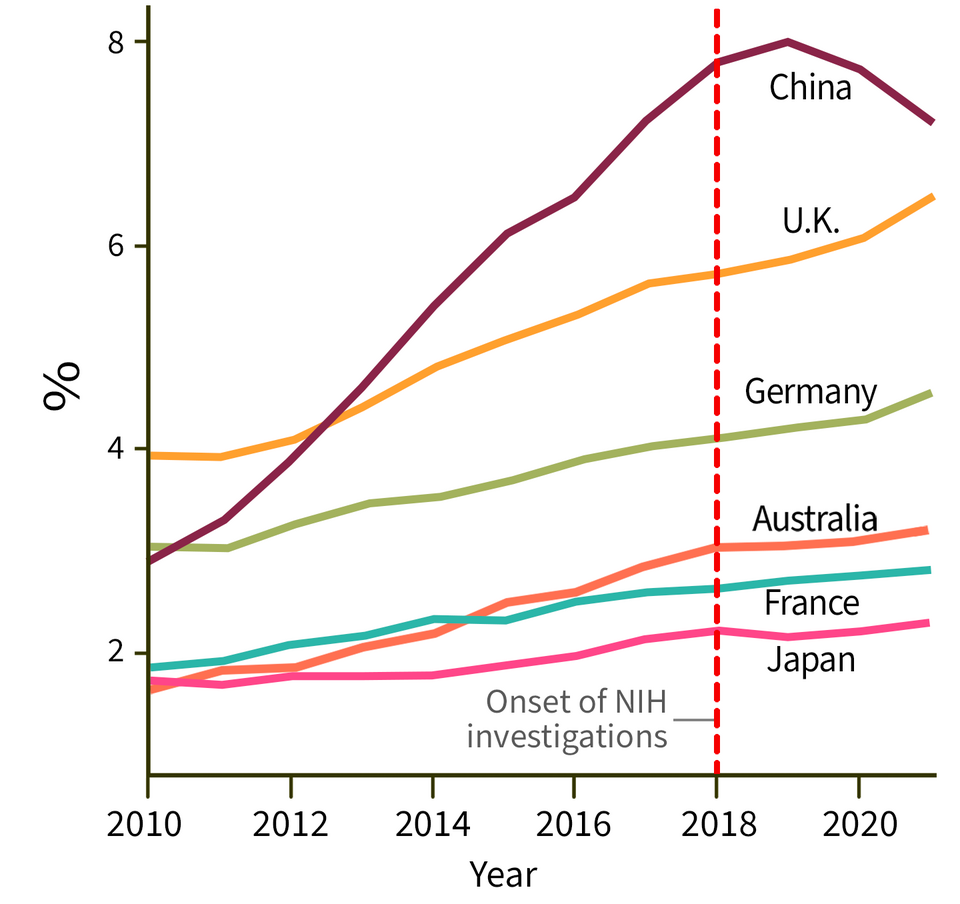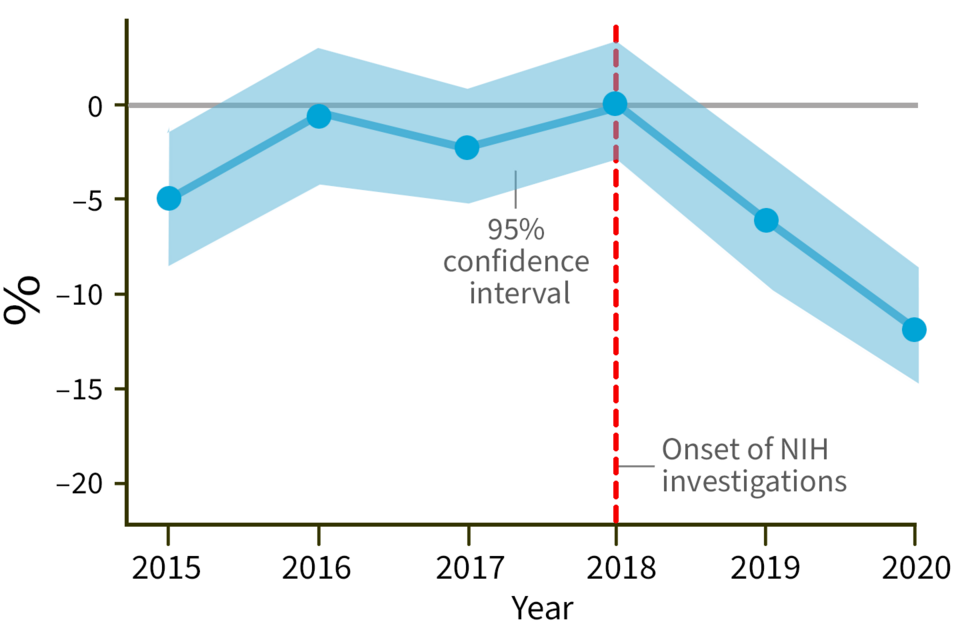What Is the Impact of U.S.-China Tensions on U.S. Science?
What Is the Impact of U.S.-China Tensions on U.S. Science? [ 5 min read ]
Insights
- Analysis of scientific papers in the database PubMed reveals that NIH investigations into hundreds of U.S. scientists since 2018 have brought about a 1.9% decline in the publication rate and 7.1% decline in the citation rate of U.S. scientists with collaborators in China, compared with U.S. scientists who had collaborated with scientists in other countries.
- The adverse effects of the investigations were observed across many U.S. institutions of higher education and were particularly salient for scientists of Asian heritage, fields that receive more funding from the NIH, and fields with a higher concentration of U.S.-China collaborations.
- In fields more affected by the NIH investigations, the U.S. and China both produced fewer publications during 2019 and 2020 compared to the rest of the world, suggesting that U.S.-China political tensions affect overall scientific progress.
- Interviews with scientists suggest that a reluctance to start or continue collaborations with China partners and the resulting loss in research talent and access to labs and equipment may drive longer-term declines in publication quantity and quality.
Source Publication: Ruixue Jia, Margaret E. Roberts, et al. (2022). The Impact of U.S.-China Tensions on U.S. Science. National Bureau of Economic Research (NBER) working paper.
Collaboration between academic institutions in the U.S. and China has come under increasing scrutiny by U.S. policymakers. In 2018, the National Institutes of Health (NIH) began investigating hundreds of scientists, largely on the basis of their failure to disclose receipt of foreign resources on federal research grants. While these investigations were not specific to China, 90% of the investigations as of July 2021 involved receipt of resources from or activities in China. How have these investigations into foreign influence in research affected the productivity of U.S. scientists?
The data. Using data from PubMed and Dimensions academic publishing databases between 2010 and 2020, researchers collected the publication records of 102,000 medical and life scientists based in the U.S. They then compared the publication records of U.S.-based scientists who have a history of collaborations in China to those with a history of foreign collaborations outside of China. The analysis compared the productivity of these two groups before the NIH investigations (2015 to 2018) to the productivity of these same two groups after the NIH investigations (2019 to 2020). Researchers defined productivity across two metrics: the number of author publication records (publication quantity), and the number of citations for each publication (publication quality). Researchers complemented their quantitative analyses with qualitative interviews with 12 scientists.
NIH investigations cause productivity decline. Prior to the NIH investigations, U.S.-based scientists who collaborated internationally tended to be more productive than those who collaborated domestically, and those who collaborated with scientists in China were the most productive of all. However, analysis of the PubMed database indicates that the NIH investigations have negatively affected both the quantity and quality of publications by U.S.-based scientists who had collaborations with China. The number of publications of these scientists declined by 1.9% and citations of their publications fell by 7.1% compared to scientists with foreign collaborators outside of China. Scientists in the U.S. were not able to offset their productivity loss by either increasing levels of domestic collaboration or increasing collaborations with other countries.
Share of U.S. publications undertaken with select international collaborations (PubMed)

Further analyses found that the science fields more subject to the NIH investigations produced fewer new publications during 2019 and 2020 relative to the rest of the world, suggesting that U.S.-China political tensions affect overall scientific progress.
Adverse effects across institutions and fields; more acute for Asian researchers.The analysis found that declines in output for U.S. scientists collaborating with counterparts in China occurred regardless of whether or not their research was funded by the NIH or China. The decline in scientific productivity was more pronounced in fields with more pre-investigation NIH funding, such as medical microbiology and immunology, and fields with more U.S.-China collaborations, such as materials engineering and physical chemistry. The negative trend held true for scientists at most sampled U.S. institutions of higher learning.
While both Asian and non-Asian scientists were adversely affected by the investigations, publications by scientists of Asian descent who had historically collaborated with scientists in China saw a 7% decline in citation rate in terms of NIH-funded publications and an almost 20% decline in citation rate in terms of China-funded publications.
Interviews confirm quantitative findings. Most of the 12 scientists interviewed felt affected by the investigations and the recent U.S.-China tensions, and, as a result, felt reluctant to start new or continue existing collaborations with institutions in China. Several scientists had their NIH funding suspended for several years. Others mentioned the loss of access to students and collaborators from China, labs, and machines that were essential to their current work. For those not directly affected by the investigations, some felt they had to choose between access to U.S. research dollars and their collaborations with scientists in China. This choice often prompted them to reorient their research toward other topics.
Change in citations of U.S. publications with China collaborators relative to those with other foreign collaborators (reference year 2018)

Political tensions generate chilling effects for U.S. science. The results of the quantitative and qualitative investigations provide evidence that U.S. scientific production and collaboration is sensitive to political pressure. The researchers conclude that the findings are likely to underestimate longer-term impacts, since it takes time for the reduction of new joint projects to appear in the data. As such, the negative effects of U.S.-China political tensions on U.S. science, as well as scientific progress worldwide, may prove even greater in the long run.
